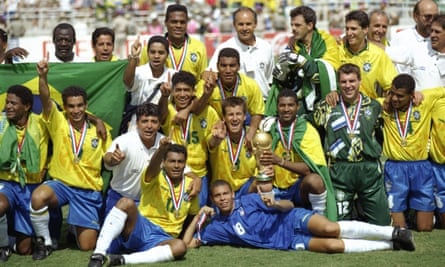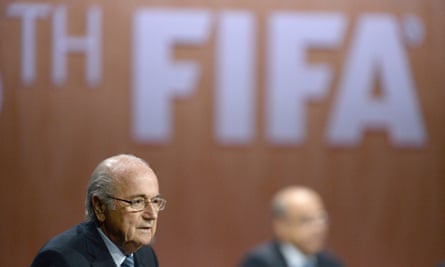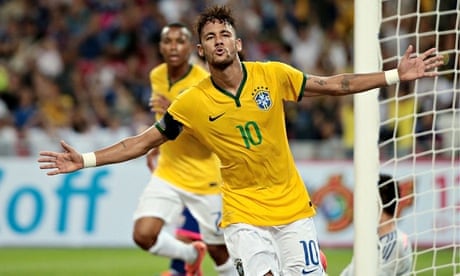Brazil was second prize for Nike.
The American sports firm lost out in the 1990s to the German multinational Adidas in the race to be an official Fifa sponsor of the World Cup. However, Nike then snatched sponsorship of Brazil’s national football team, and future World Cup hosts, in a move it later said was crucial to propelling it to one of the biggest brands in the game.
Now that deal has come back to haunt the company with this week’s corruption charges in the US against Fifa officials. The lengthy American indictment against 14 present and former Fifa executives does not name Nike. It refers solely to “Sportswear Company A”. Neither do the charges accuse the unnamed sportswear company of paying bribes or any other crimes.
However, joining the dots from the information provided by US prosecutors leads inextricably to Nike’s $160m deal with Brazil and from there to difficult questions for the company about the allegation that it paid tens of millions of dollars into a Swiss bank account outside of the original sponsorship contract. That money, the US indictment alleges, was divvied up as “bribes and kickbacks” paid to an official who negotiated the deal on behalf of Brazil although there is no suggestion that Nike knew.
The company is also likely to be embarrassed by the indictment’s evidence that the two executives with which it negotiated the Brazil sponsorship agreement, José Hawilla, the head of a Brazilian multinational sports marketing company who has pleaded guilty to corruption charges over the Nike deal, and an unnamed senior Fifa and Brazilian football official, are repeatedly identified in the indictment as at the heart of an extensive web of graft across the game in the Americas over many years.
Nike implicitly confirmed it was the unidentified sportswear company in a statement immediately after the US indictments were announced in saying it was cooperating with the investigation.
“Nike believes in ethical and fair play in both business and sport and strongly opposes any form of manipulation or bribery,” it said. “We have been cooperating, and will continue to cooperate, with the authorities.”
However, as scrutiny of its role grew in the following hours, the company issued a more strongly worded denial on Thursday.
“The charging documents unsealed [on Wednesday] in Brooklyn do not allege that Nike engaged in criminal conduct,” it said. “There is no allegation in the charging documents that any Nike employee was aware of or knowingly participated in any bribery or kickback scheme.”
Nike is not unused to crises that threaten to taint the brand it has nurtured from its sprawling campus outside Portland, Oregon. It has confronted the cyclist Lance Armstrong’s drug taking, the conviction of the South African double amputee sprinter Oscar Pistorius over the killing of his girlfriend and the golfer Tiger Woods’ torrid private life.
However, David Carter, the director of the University of Southern California’s Sports Business Institute, said this may prove more challenging for Nike because the US has said the corruption investigation is far from over.
“Nike are going to be paying attention whether they want to or not because this story is not going to be going away, at least until we’re through 2022 [and the World Cup in Qatar],” he said. “Because even if this whole mess gets cleaned up, there’s the residue of it. It’s still going to be prominently discussed many, many years down the road. If there’s ongoing litigation, it’s certainly going to be percolating for a very long term. You’re going to find quite a few individuals and companies that are going to get entangled in this over time. How they react is going to go a long way to rehabilitating their reputation and their brand with consumers.”

The indictment says that after Brazil won the 1994 World Cup in the US, “a representative of a multinational sportswear company headquartered in the United States” approached the Brazilian football federation to see if it was interested in a sponsorship deal.
The contract was brokered by Hawilla’s Traffic Group, a Brazilian multinational which got into football marketing in the 1980s. Traffic spread its wings across the Americas, establishing a US arm in 2003. The indictment puts the company at the centre of many of the accusations of corruption in the western hemisphere particularly from the late 1990s when it began dealing directly with Fifa over the Club World Championship. Several alleged co-conspirators in the indictment were also Traffic executives who went on to work for the regional football federation for North and Central America and the Caribbean, Concacaf.
The Nike contract required the sportswear company to pay the Brazilian football association $160m over 10 years as a co-sponsor and exclusive provider of boots and uniforms with the company’s distinctive tick logo. The indictment alleged that the sportswear company then made a separate payment that was not part of the contract.
“Additional financial terms were not reflected in the agreement,” the indictment says. “Sportswear Company A agreed to pay a Traffic affiliate with a Swiss bank account an additional $40m in base compensation on top of the $160m it was obligated to pay to [the Brazilian football federation] pursuant to the agreement.” Three days after the lengthy main deal was sealed in July 1996, Nike signed an additional one-page agreement requiring it to pay to Traffic Brazil “marketing fees earned upon successful negotiation and performance of the … [agreement]”.

The indictment said that over the next three years, Traffic invoiced Nike for $30m in payments. Hawilla then allegedly paid half of that money to a high-ranking official of Fifa, the South American football federation and the Brazilian football federation who had negotiated the deal with Nike. The US indictment calls that payment “a bribe and kickback”.
Rick Burton, the former head of the University of Oregon’s Warsaw Sports Marketing Center, who worked closely with Nike as it expanded its business in China, said: “Fifa has been under the microscope for a long time. Nike could have chosen to get out years ago but didn’t.”
However, Burton, who is now professor of sport management at Syracuse university, is doubtful the accusations against Fifa executives will damage the Nike brand so long as there is no firm evidence of criminal intent.
“I don’t think it taints Nike at all,” he said. “I think it taints Fifa and the World Cup. I think for a lot of people that follow football and follow Fifa, this is not going to come as a surprise. For some people this is going to feel like this has been playing out since the actual selection of Russia and Qatar. I think a lot of people will say: ‘I knew this all along.’”
Carter said football fans may not be terribly bothered but if the continuing US investigation leads to further revelations and more prosecutions it could be damaging to the image Nike is building with its foundation to funds anti-poverty programmes such as The Girl Effect to educate young women and grants to groups working with Native American and Aboriginal communities.
“I think there’s a heightened sense of responsibility that comes with the brand they’ve created,” he said. “That brings with it certain responsibilities whether real or perceived. The inference of what’s going on now requires Nike to have its own contingency plan about what to do. Clearly as global brand that has had issues over the years, Nike is very adept at this.”
Burton said that the real challenge for Nike may not be the accusations but how it responds to them.
“Nike has got to be incredibly sensitive to how this is going to appear in other countries because the love of football in Europe, in South America dictates that there are going to be some people who believe that the Americans are creating an attack on the beautiful game,” he said. “Nike’s got to tread gently here because on the one hand they have to be appalled by corruption but on the other hand the recognise that different cultures are going to view all of these proceedings differently.”
